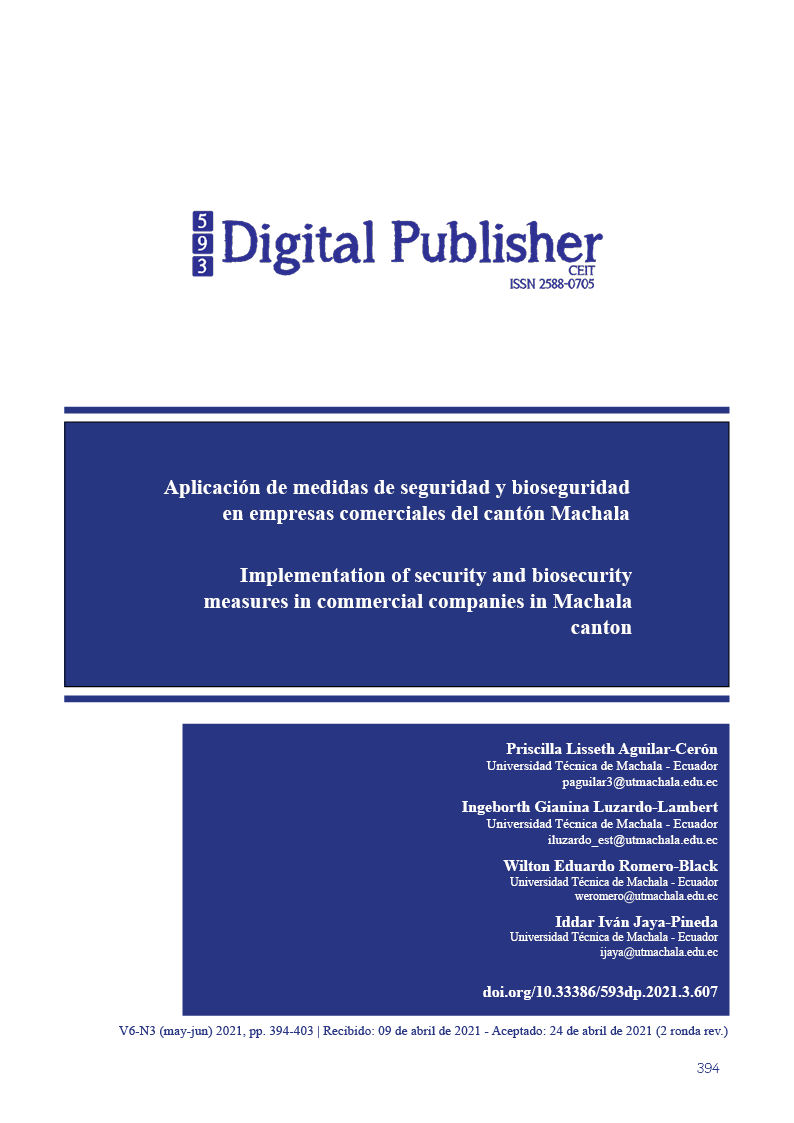Implementation of security and biosecurity measures in commercial companies in Machala canton
Main Article Content
Abstract
The Corona Virus Disease 2019 or better known as Covid-19 is caused by the new coronavirus called SARS-CoV-2, this virus has changed the lifestyle and health of all people in the world, including merchants, who are those that have a greater direct contact with citizens, it is for this reason that this project aims to learn about the security and biosafety measures that are applied in the various commercial companies of the Machala canton, for this a thorough bibliographic research is carried out where the prevention measures offered by the National Government, the Ministry of Health, the WHO, and more are considered, in order to know which ones are applied from the beginning of the quarantine to the present. For this, a Quali-quantitative research is carried out, that is, in addition to carrying out the bibliographic research, the information obtained by an online survey is also considered, which was applied to the managers or owners of the commercial premises of the 3 main centers commercials of the city of Machala, presenting as a result a regular importance, of them, in the face of protection measures, because they make use of certain biosafety and security measures, these being decreased from the beginning of the quarantine to the present In addition to the fact that there are still shortcomings such as the suspension of the use of signage, a contingency plan, employee training, among others.
Downloads
Article Details

This work is licensed under a Creative Commons Attribution-NonCommercial-ShareAlike 4.0 International License.
1. Derechos de autor
Las obras que se publican en 593 Digital Publisher CEIT están sujetas a los siguientes términos:
1.1. 593 Digital Publisher CEIT, conserva los derechos patrimoniales (copyright) de las obras publicadas, favorece y permite la reutilización de las mismas bajo la licencia Licencia Creative Commons 4.0 de Reconocimiento-NoComercial-CompartirIgual 4.0, por lo cual se pueden copiar, usar, difundir, transmitir y exponer públicamente, siempre que:
1.1.a. Se cite la autoría y fuente original de su publicación (revista, editorial, URL).
1.1.b. No se usen para fines comerciales u onerosos.
1.1.c. Se mencione la existencia y especificaciones de esta licencia de uso.
References
Accinelli, R. A., Zhang, X. C., Ju, W. J., Yachachin, C. J., Cáceres, P. J., Tafur, B. K., . . . Paiva, A. A. (2020). COVID-19: la pandemia por el nuevo virus SARS-CoV-2. Revista Peruana de Medicina Experimental y Salud Pública, 37(2), 302-311. doi:https://doi.org/10.17843/rpmesp.2020.372.5411
Alcaldia de Esmeraldas. (2020). PROTOCOLOS DE BIOSEGURIDAD PARA ACTIVIDADES ECONÓMICAS DEL CANTÓN ESMERALDAS. Esmeraldas: Alcaldia de Esmeraldas.
Chiong, L. M., Leisewitz, V. A., Márquez, R. F., Vironneau, J. L., Álvarez, S. M., Tischler, N., . . . Moreno, M. R. (2018 ). Manual de Normas de Bioseguridad y Riesgos Asociados-Fondecyt-CONICYT. Chile: Comisión Nacional de Investigación Científica y Tecnológica.
COE, C. D. (2020). RESOLUCION, COE NACIONAL - 28 DE ABRIL DE 2020. Quito: gestionderiesgos.gob.ec.
Díaz, N. V., & Calzadilla, N. A. (2016). Artículos científicos, tipos de investigación y productividad científica en las Ciencias de la Salud. Artículos de reflexión, 16(1), 115-121.
Ecuador, G. d. (2020). PROTOCOLO CENTROS COMERCIALES FRENTE A LA EXPOSICIÓN DEL COVID-19. Ecuador: gestionderiesgos.gob.ec. Obtenido de https://www.gestionderiesgos.gob.ec/wp-content/uploads/2020/05/protocolo-centros-comerciales.pdf
Equipo Humanitario del Pais. (2020). Plan de respuesta Humanitaria COVID-19 Ecuador. Ecuador: Naciones Unidas.
Martín, S. G., & Lafuente, V. (2017). Referencias bibliográficas: indicadores para su evaluación en trabajos científicos. Investigación bibliotecológica, 31(71), 151 - 180.
Mendieta, B. E., & Peñaherrera, A. E. (2020). PROTOCOLO DE MEDIDAS DE BIOSEGURIDAD PARA ESTABLECIMIENTOS, PREVIO A SU REAPERTURA, EN EL ÁMBITO DE LA EMERGENCIA SANITARIA POR COVID- 19 . Loja : Municipio de Loja/Camara de Comercio de Loja .
MPCEIP, M. d., & Ministerio de Trabajo. (2020). PROTOCOLO DE BIOSEGURIDAD PARA EL SECTOR INDUSTRIAL Y COMERCIAL – COVID-19. Ecuador: Comite empresarial ecuatoriano. Obtenido de https://www.produccion.gob.ec/wp-content/uploads/2020/03/DOC_CORONA.pdf
OMS, O. M. (07 de Octubre de 2020). Organizacion Mundial de la Salud. Obtenido de Brote de enfermedad por coronavirus (COVID-19): orientaciones para el público: https://www.who.int/es/emergencies/diseases/novel-coronavirus-2019/advice-for-public?gclid=Cj0KCQjwl9GCBhDvARIsAFunhsl3dp80UXpEt-tUFct6PHDmA31lidVZX_6KTcAxDzfrdlNvMtvs8aAnKPEALw_wcB
Peraza, d. A. (2020). Salud laboral frente a la pandemia del COVID-19 en Ecuador. MediSur, 18(3), 507-511. Obtenido de http://scielo.sld.cu/pdf/ms/v18n3/1727-897X-ms-18-03-507.pdf
Ruiz, d. S. (2017). Conocimiento de las medidas de bioseguridad en personal de salud. Horizonte Médico (Lima), 17(4), 53-57. doi:http://dx.doi.org/10.24265/horizmed.2017.v17n4.09
Sánchez, F. F. (2019). Fundamentos epistémicos de la investigación cualitativa y cuantitativa: Consensos y disensos. Revista Digital de Investigación en Docencia Universitaria, 13(1), 102-122.
Secretaria de Trabajo y Seguridad Social. (2020). Protocolo de Bioseguridad por motivo de Pandemia COVID-19 para Supermercados. Versión 5. Tegucigalpa: Secretaria de Trabajo y Seguridad Social.
Tropiano, Y., & Noguera, A. (Mayo de 2020). El protocolo de bioseguridad, bajo el modelo de varios países de América Latina, y papel de los servicios y/o comité de seguridad y salud laboral ante el Covid-19. Obtenido de Cielolaboral.com: http://www.cielolaboral.com/wp-content/uploads/2020/05/tropiano_noguera_noticias_cielo_n5_2020.pdf
Vecslir, L., & Rodríguez, L. (2018). Centros Comerciales a Cielo Abierto como política de renovación de las centralidades tradicionales en el Conurbano Bonaerense. Territorios, 38, 15-40. doi:doi: http://dx.doi.org/10.12804/revistas.urosario.edu.co/territorios/a.5499





